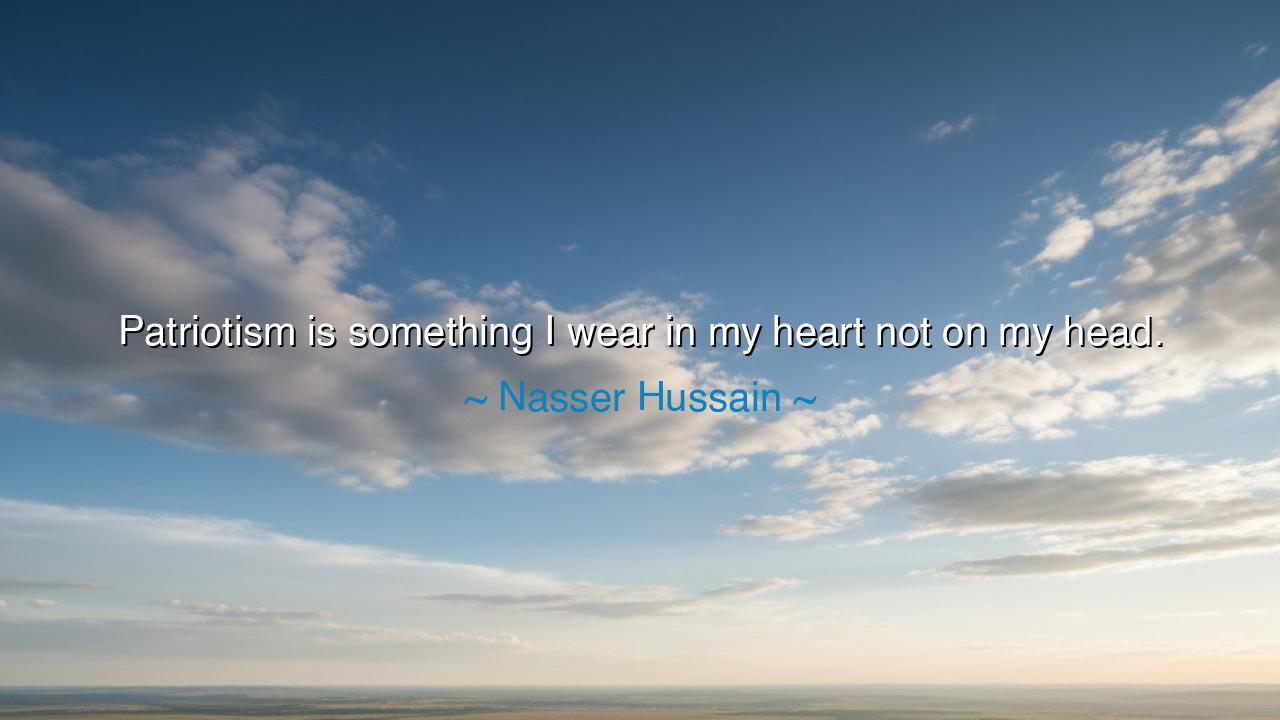
Patriotism is something I wear in my heart not on my head.






“Patriotism is something I wear in my heart not on my head.” Thus declared Nasser Hussain, the captain of England’s cricket team, when asked why he did not don the flag upon his cap. In these words lies a wisdom that cuts through the shallow show of symbols and reaches for the deeper spirit of love for one’s land. For what is patriotism if it is only cloth and emblem? What is loyalty if it is but the sound of a chant? Hussain’s voice reminds us that the truest devotion to one’s country is not displayed upon the brow for all to see, but carried silently within the heart, guiding every thought, every action, every sacrifice.
The origin of this saying is born in the tension between appearance and essence. In the world of sport and politics alike, men often drape themselves in colors, flags, and slogans, seeking to prove their loyalty by outward show. Yet Hussain, of Indian origin but English by life and service, knew that his love of England would be questioned by some. His answer was not to bow to appearances, but to affirm a deeper truth: that patriotism cannot be stitched into a cap, nor shouted into being, but must dwell in the soul. His words are a shield against hypocrisy, a reminder that true love of country is measured not by spectacle, but by sincerity.
History offers us kindred examples. Consider the life of Marcus Aurelius, the philosopher-emperor of Rome. He wore no extravagant crown, nor did he boast in public of his devotion to Rome. Yet his daily labors, his sleepless nights at the borders, his tireless service to his people revealed a heart aflame with duty. His patriotism was not carved in marble nor paraded in festivals, but inscribed in the discipline of his life. Like Hussain’s words, his legacy teaches us that love of country is not ornament but essence.
On the other hand, history also warns us of those who wore patriotism upon their heads but not within their hearts. Demagogues and tyrants often waved flags and demanded songs, but their actions betrayed their people. The loudest cries of loyalty often concealed ambition and cruelty. Their patriotism was a mask, not a reality. In this, Hussain’s wisdom becomes even clearer: better a heart that loves silently than a head that wears false symbols loudly.
The lesson for us, then, is simple yet profound: let your patriotism be shown in your deeds, not only in your display. Love your country by serving it faithfully, by speaking truth when it falters, by lifting your neighbor when he stumbles, by honoring the sacrifices of those before you. A flag upon the head may inspire for a moment, but a heart filled with devotion will sustain for a lifetime.
In practical terms, this means we must ask ourselves daily: do my actions strengthen the fabric of my nation? Do I live in a way that honors its ideals? Do I treat my fellow citizens with fairness and dignity? If the answer is yes, then your patriotism is genuine, whether or not you wear its symbols upon your body. If the answer is no, then no flag nor song can disguise the emptiness within.
So let Hussain’s words endure as a guiding flame: “Patriotism is something I wear in my heart not on my head.” May we learn that love of country is not about appearance but about essence, not about shouting but about serving, not about the adornment of the head but the adornment of the heart. In this truth lies the path to a nobler loyalty, one that can neither be shaken by criticism nor diminished by the passing of time.






AAdministratorAdministrator
Welcome, honored guests. Please leave a comment, we will respond soon